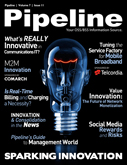By
Jesse Cryderman
Gone are the days when a telco’s role was simply to provide reliable voice service and send a bill at the end of the month. Now, carriers are required to manage greater and greater amounts of data on their wireless networks while a wider variety of devices are activated everyday, and consumers desire greater functionality and app services.
While parsing out the processes that are required to enable today’s networks, questions of new billing and charging models naturally arise: Can traditional systems keep up with the tidal wave of demand? Are there ways to monetize new services that require real-time billing and charging? What are some innovative solutions?
Several B/OSS vendors believe the time is now for carriers to move to a converged billing and charging platforms that encompass both pre- and post-paid customer bases, and offer flexibility for both carriers and customers.
Pipeline recently spoke with a pioneer in the field of billing and charging, Matrixx Software CEO Dave Labuda, as well as Scott Rice, VP Production Billing with Sprint to get both the vendor and carrier perspectives, and shed some light on real-time billing and charging.
Dave Labuda, Founder and CEO, Matrixx Software
Pipeline:
Is there a need for a departure from traditional batch billing, and why?







